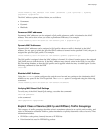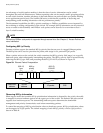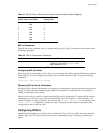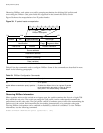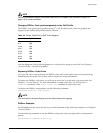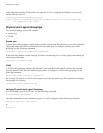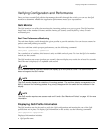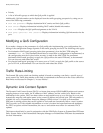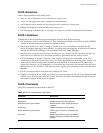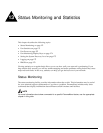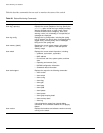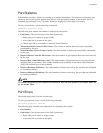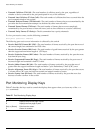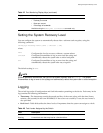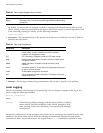
Dynamic Link Context System
Summit 200 Series Switch Installation and User Guide 169
DLCS Guidelines
Follow these guidelines when using DLCS:
• Only one user is allowed on one workstation at a given time.
• A user can be logged into many workstations simultaneously.
• An IP-address can be learned on only one port in the network at a given time.
• Multiple IP-addresses can be learned on the same port.
• DLCS mapping is flushed when a user logs in or logs out, or when an end-station is shutdown.
DLCS Limitations
Consider the following limitations concerning data received from WINS snooping:
• DLCS does not work for the WINS server. This is because the WINS server does not send NETBIOS
packets on the network (these packets are address to itself).
• When the IP address of a host is changed, and the host is not immediately rebooted, the old
host-to-IP address mapping is never deleted. You must delete the mapping of the host-to-IP address
through the EEM Policy Manager or ExtremeWare EPICenter Policy Manager.
• When the host is moved from one port to another port on a switch, the old entry does not age out
unless the host is rebooted or a user login operation is performed after the host is moved.
• DLCS information is dynamic, therefore, if the switch is rebooted, the information is lost. This
information is still stored in the policy-server. To delete the information from the policy system, you
must explicitly delete configuration parameters from the EEM or ExtremeWare EPICenter Policy
Applet user interface. As a workaround, you can delete the switch that was rebooted from the list of
managed devices in the EEM or EPICenter Inventory Applet, and re-add the switch to the Inventory
Manager.
• DLCS is not supported on hosts that have multiple NIC cards.
• IPQoS is not supported to a WINS server that is serving more than one VLAN. If you attempt to add
a WINS server to serve more than one VLAN, and there are IPQoS rules defined for that server, the
command to add the WINS server is rejected.
DLCS Commands
The DLCS commands are described in Table 45.
Table 45: DLCS Configuration Commands
Command Description
clear dlcs Clears learned DLCS data.
disable dlcs Disables snooping of DLCS packets.
disable dlcs ports <port-number> Disables port on which DLCS packets are
snooped.
enable dlcs Enables snooping of DLCS packets.
enable dlcs ports <port-number> Enables port on which DLCS packets are
snooped.
show dlcs Displays ports which are snooping WINS
packets, along with the data that has been
learned.



